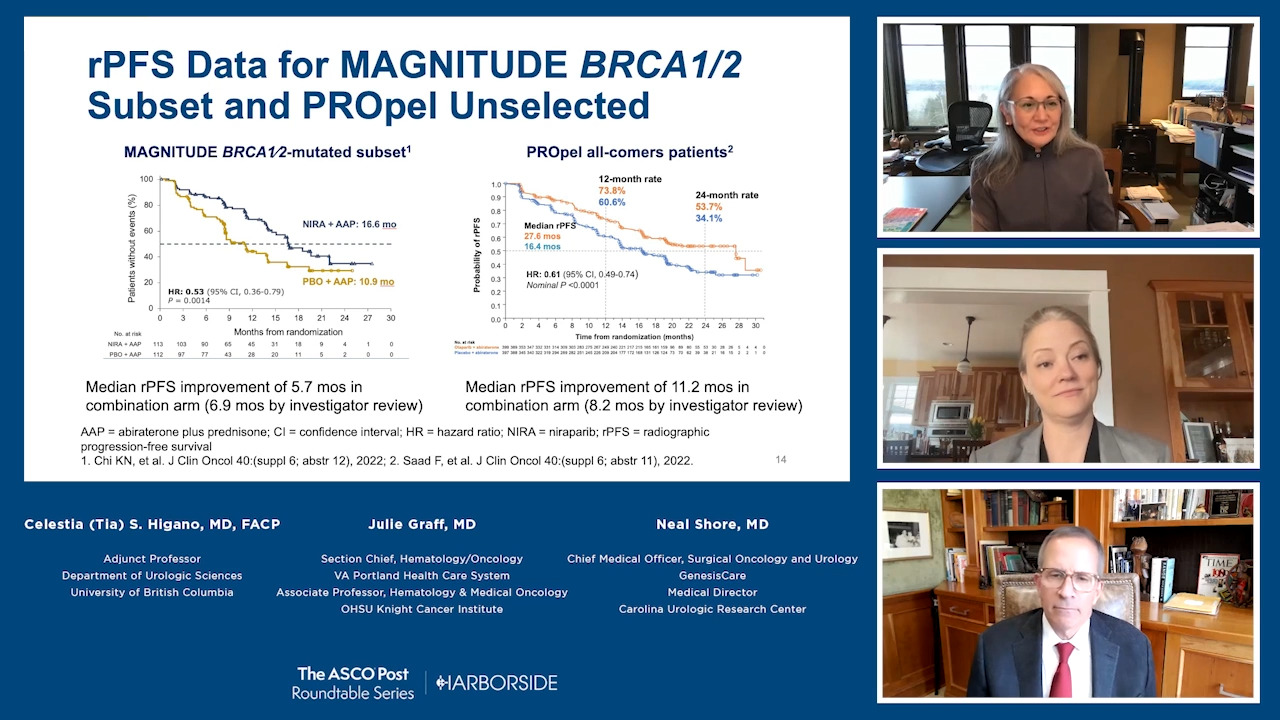Differences in Germline Variant Spectrum Between Black and White Men With Prostate Cancer
In a study presented at the 2022 ASCO Annual Meeting (Abstract 10502) and simultaneously published in JCO Precision Oncology, Veda N. Giri, MD, and colleagues found that Black men with prostate cancer exhibited a lower frequency and narrower spectrum of germline pathogenic or likely pathogenic...
Neal D. Shore, MD, on Germline Genetic Testing and Its Impact on Prostate Cancer Clinical Decision-Making
Neal D. Shore, MD, of the Carolina Urologic Research Center, discusses his study findings, showing that germline genetic testing influenced care for patients with prostate cancer. Men whose genetic test was positive for a pathogenic germline variant received more recommendations for changes to follow-up and treatment, and for testing and counseling of relatives, than did patients with negative or uncertain test results (Abstract 10500).
Alicia K. Morgans, MD, MPH, and Michael S. Hofman, MBBS, on Prostate Cancer: New Data on Lutetium-177–PSMA-617 (LuPSMA) vs Cabazitaxel
Alicia K. Morgans, MD, MPH, of Dana-Farber Cancer Institute, and Michael S. Hofman, MBBS, of Peter MacCallum Cancer Centre, University of Melbourne, discuss follow-up results on LuPSMA vs cabazitaxel in patients with metastatic castration-resistant prostate cancer progressing after docetaxel treatment. The findings suggest that LuPSMA is a suitable option for this population, with fewer adverse events, higher response rates, improved patient-reported outcomes, and similar overall survival compared with cabazitaxel (Abstract 5000).
Alicia K. Morgans, MD, MPH, and Ian D. Davis, PhD, MBBS, on Prostate Cancer: Updated Overall Survival Outcomes With Enzalutamide
Alicia K. Morgans, MD, MPH, of Dana-Farber Cancer Institute, and Ian D. Davis, PhD, MBBS, of Monash University and Eastern Health, discuss the latest findings from ANZUP Cancer Trials Group’s ENZAMET cooperative group trial of enzalutamide in patients with metastatic hormone-sensitive prostate cancer. The results corroborate the benefit of enzalutamide with improved overall survival, and involve some exploratory subgroup analyses (Abstract LBA5004).
AUA, ASTRO Release New Clinically Localized Prostate Cancer Guideline
Recently, the American Urological Association (AUA), in partnership with the American Society for Radiation Oncology (ASTRO), released the 2022 clinical practice guideline for the management of clinically localized prostate cancer. The guideline has been endorsed by the Society of Urologic Oncology ...
Does Treatment With 5α-Reductase Inhibitors Impact the Risk of Dying of Prostate Cancer Among Men Without a Prior Diagnosis of the Disease?
In a Swedish study reported in JAMA Oncology, Björnebo et al found that longer use of 5α-reductase inhibitors (5-ARIs) for the treatment of benign prostatic hyperplasia was associated with a reduced risk of prostate cancer mortality among men without a prior diagnosis of prostate cancer. As stated...
Adverse Events Seen With Abiraterone or Enzalutamide Among Patients With Advanced Prostate Cancer
Men taking either of the two most common oral medications for advanced prostate cancer who had also undergone hormone therapy to treat their disease were at higher risk of serious metabolic or cardiovascular issues than patients who were receiving hormone therapy alone, according to findings...
Addition of ADT and Pelvic Lymph Node Radiotherapy to Salvage Prostate Bed Radiotherapy After Prostatectomy
In a phase III trial (NRG Oncology/RTOG 0534 SPPORT) reported in The Lancet, Alan Pollack, MD, PhD, and colleagues found that both the addition of short-term androgen-deprivation therapy (ADT) and the addition of ADT and pelvic lymph node radiotherapy (PLNRT) to salvage prostate bed radiotherapy...
Polygenic Score May Enable More Precise PSA Screening for Prostate Cancer
The use of a polygenic score incorporating variations in prostate-specific antigen (PSA) values that are not due to cancer may allow for more precise PSA screening, according to findings of a large genome-wide association study presented at the American Association for Cancer Research (AACR) Annual ...
SWOG-1216: Orteronel vs Bicalutamide With ADT for Metastatic Hormone-Sensitive Prostate Cancer
As reported in the Journal of Clinical Oncology by Neeraj Agarwal, MD, and colleagues, the phase III SWOG-1216 trial showed no significant improvement in overall survival—the study’s primary endpoint—with orteronel plus androgen-deprivation therapy (ADT) vs bicalutamide plus ADT in patients with...
Overall Survival in the ARCHES Trial: Addition of Enzalutamide to ADT for Metastatic Hormone-Sensitive Prostate Cancer
As reported in the Journal of Clinical Oncology by Andrew J. Armstrong, MD, ScM, and colleagues, the final overall survival analysis of the phase III ARCHES trial showed a significant benefit with the addition of enzalutamide to androgen-deprivation therapy (ADT) in patients with metastatic...
Matthew R. Smith, PhD, MD, on Prostate Cancer: Phase III Data on Darolutamide, Androgen Deprivation, and Docetaxel
Matthew R. Smith, PhD, MD, of Massachusetts General Hospital Cancer Center, discusses overall survival findings from the ARASENS trial, which assessed the efficacy of the androgen receptor inhibitor darolutamide vs placebo in combination with androgen-deprivation therapy and docetaxel for patients with metastatic hormone-sensitive prostate cancer (Abstract 13).
Timothy A. Yap, MBBS, PhD, on Ovarian, Breast, Pancreatic, and Prostate Cancers With Genetic Mutations: A First-in-Human Trial of AZD5305
Timothy A. Yap, MBBS, PhD, of The University of Texas MD Anderson Cancer Center, discusses results from the PETRA study, a first-in-class, first-in-human trial of the next-generation PARP1-selective inhibitor AZD5305 in patients with BRCA1/2, PALB2, or RAD51C/D mutations in advanced or metastatic ovarian cancer, HER2-negative breast cancer, pancreatic, or prostate cancer. Target engagement was demonstrated across all dose levels, and antitumor activity was observed in selected tumor and molecular subtypes.
PSMA-Targeted Radioligand Therapy for Metastatic Castration-Resistant Prostate Cancer
In this video, Drs. Celestia (Tia) Higano, Julie Graff, and Neal Shore discuss the role of prostate-specific membrane antigen (PSMA)-targeted radioligand therapy in the treatment of metastatic castration-resistant prostate cancer. The patient is an 81-year-old man with 13-year history of prostate cancer who had received multiple prior lines of treatment for his metastatic disease, but no prior taxane. After his PSA rose again, he opted to travel abroad for lutetium (Lu-177) PSMA therapy, since he was not eligible for trials in the United States. The faculty discuss the VISION trial and the current and future role of PSMA-targeted radioligand therapy in prostate cancer. Editor’s Note: This video was filmed prior to the FDA approval of Lu-177 PSMA radioligand therapy on March 23, 2022.
First-Line Therapy for BRCA2-Mutated Metastatic Castration-Resistant Prostate Cancer
This is Part 3 of Updates in Prostate Cancer, a four-part video roundtable series. Scroll down to watch the other videos from this Roundtable. In this video, Drs. Celestia (Tia) Higano, Julie Graff, and Neal Shore discuss the first-line therapy for BRCA2-mutated metastatic castration-resistant prostate cancer. The patient is a 69-year-old man with new castration-resistant prostate cancer who was previously treated with androgen-deprivation therapy plus docetaxel for metastatic hormone-sensitive prostate cancer and has a known BRCA2 mutation. The faculty discuss their choices for first-line therapy for this patient, reviewing the current NCCN recommendations, the role of PARP inhibitors, and recent data from the PROpel and MAGNITUDE trials.
Doublet or Triplet Androgen-Deprivation Therapy Options for Metastatic Prostate Cancer
This is Part 2 of Updates in Prostate Cancer, a four-part video roundtable series. Scroll down to watch the other videos from this Roundtable. In this video, Drs. Celestia (Tia) Higano, Julie Graff, and Neal Shore discuss doublet and triplet androgen-deprivation therapy options for metastatic prostate cancer. The patient is a 71-year-old man with metastatic prostate cancer, a PSA of 275, and a positive bone scan, who has begun to receive androgen-deprivation therapy. The faculty discuss what, if any, additional therapy they might add to this patient’s treatment regimen, weighing the current doublet and triplet combination options for metastatic hormone-sensitive prostate cancer. They review the results of the recent PEACE-1 and ARASENS trials and emphasize the importance of assessing bone mineral density and of encouraging genetic counseling for these patients.
Elderly Patient With Metastatic Hormone-Sensitive Prostate Cancer
This is Part 1 of Updates in Prostate Cancer, a four-part video roundtable series. Scroll down to watch the other videos from this Roundtable. �In this video, Drs. Celestia (Tia) Higano, Julie Graff, and Neal Shore discuss the management of metastatic hormone-sensitive prostate cancer in elderly patients. The patient is a fit 88-year-old man with a history of localized prostate cancer who was originally treated with stereotactic body radiation therapy and is reluctant to start androgen-deprivation therapy for his metastatic disease due to the potential side effects. The faculty discuss the importance of counseling patients about side effects of treatment and when to consider androgen-deprivation therapy rather than metastasis-directed therapy alone, reviewing the results of the phase III HERO trial.
High-Dose Radiotherapy With Short- vs Long-Term Androgen Deprivation in Localized Prostate Cancer
As reported in The Lancet Oncology by Zapatero et al, 10-year results of the Spanish phase III DART 01/05 trial did not support the 5-year findings of significantly improved biochemical disease–free, metastasis-free, and overall survival with long-term vs short-term androgen deprivation plus...
Less Prostate Cancer Screening Reduces Overdiagnosis but May Miss Aggressive Cases
Over the past 15 years, public health authorities have downgraded recommendations for the prostate-specific antigen (PSA) test as a screening tool to reduce the overdiagnosis and overtreatment of men with low-grade prostate cancer. Researchers from Weill Cornell Medicine have found that while these ...
PEACE-1 Trial: Addition of Abiraterone Plus Prednisone to ADT and Docetaxel in De Novo Metastatic Castration-Sensitive Prostate Cancer
As reported in The Lancet by Fizazi et al, the phase III PEACE-1 trial has shown that the addition of abiraterone and prednisone to androgen-deprivation therapy (ADT) and docetaxel improved radiographic progression-free survival and overall survival in patients with de novo metastatic...
Accounting for Genetic Factors That Cause Normal Variations in PSA Levels May Improve the Accuracy of Prostate Cancer Detection
The accuracy of prostate-specific antigen (PSA) screening for prostate cancer could be improved by accounting for genetic factors that cause changes in PSA levels not associated with cancer, according to data presented by Kachuri et al during the American Association for Cancer Research (AACR)...
Julio M. Pow-Sang, MD, on Nonmetastatic Prostate Cancer: Update on Best Management Practices
Julio M. Pow-Sang, MD, of Moffitt Cancer Center, discusses the treatment landscape for localized prostate cancer and its heterogeneity, the critical importance of stratifying risk to determining treatment options, and the continued improvement of therapy in the field.
Expert Point of View: Elisabeth I. Heath, MD, FACP, and Oliver Sartor, MD
Formal discussant of the ARASENS trial, Elisabeth I. Heath, MD, FACP, Professor of Oncology and Associate Center Director, Translational Sciences, at Karmanos Cancer Institute in Detroit, commented on the changing paradigm in prostate cancer treatment. “The narrative is changing to triplet therapy, ...
Study Reports Modest Gain in Progression-Free Survival With Continued Enzalutamide in Advanced Prostate Cancer
Enzalutamide is a common first-line choice for patients with metastatic castration-resistant prostate cancer, but response in some patients eventually wanes and then patients are switched to a different treatment. According to the phase IIIb PRESIDE trial, reported at the 2022 ASCO Genitourinary...
First-Line Olaparib Plus Abiraterone Extends Radiographic Progression-Free Survival in Men With Metastatic Castration-Resistant Prostate Cancer
The PARP inhibitor olaparib in combination with abiraterone demonstrated a statistically significant and clinically meaningful improvement in radiographic progression-free survival vs current standard-of-care abiraterone as a first-line treatment for patients with metastatic castration-resistant...
Xin Gao, MD, on Prostate Cancer: Early-Phase Results on Bavdegalutamide
Xin Gao, MD, of Massachusetts General Hospital, discusses phase I/II findings on bavdegalutamide, an androgen receptor protein degrader, which showed clinical activity in heavily pretreated patients with metastatic castration-resistant prostate cancer who received one to two prior novel hormonal agents.
Triplet Combination Improves Overall Survival in Metastatic Hormone-Sensitive Prostate Cancer
Triplet therapy with the oral androgen receptor inhibitor darolutamide plus docetaxel plus androgen-deprivation therapy significantly improved overall survival in patients with metastatic hormone-sensitive prostate cancer vs docetaxel plus androgen-deprivation therapy, according to results of the...
Observation vs Screening Spinal MRI in Patients With Castration-Resistant Prostate Cancer and Asymptomatic Spinal Metastases
As reported in The Lancet Oncology by David Dearnaley, FRCR, and colleagues, the phase III PROMPTS study has shown that a strategy of routine screening with spinal magnetic resonance imaging (MRI) and preemptive treatment to prevent clinical spinal cord compression is likely not warranted in...
FDA Approves Radioligand for Metastatic Castration-Resistant Prostate Cancer
On March 23, the U.S. Food and Drug Administration approved lutetium Lu-177 vipivotide tetraxetan (Pluvicto) for the treatment of adult patients with prostate-specific membrane antigen (PSMA)-positive metastatic castration-resistant prostate cancer who have been treated with androgen receptor...
Tanya B. Dorff, MD, on Prostate Cancer: Early Data on PSCA-Targeted CAR T-Cell Therapy
Tanya B. Dorff, MD, of City of Hope National Medical Center, discusses the first-in-human phase I findings showing that prostate stem cell antigen (PSCA) CAR T-cell therapy is feasible in patients with metastatic castration-resistant prostate cancer, with preliminary antitumor activity exhibited.
Neil E. Fleshner, MD, MPH, on High-Risk Prostate Cancer: New Data on Abiraterone and Cabazitaxel
Neil E. Fleshner, MD, MPH, of the Princess Margaret Cancer Centre, discusses phase II results from the ACDC-RP trial, which indicate a significant tumor response to neoadjuvant abiraterone acetate plus prednisone and leuprolide, with or without cabazitaxel, in patients with high-risk prostate cancer. Those who exhibited either a complete response or minimal residual disease experienced higher rates of progression-free survival. According to Dr. Fleshner, genomic efforts are underway to determine predictors of response.
All-Cause Mortality After Adjuvant vs Early Salvage Radiation Therapy Following Radical Prostatectomy for pN1 Prostate Cancer
In a study in a German cohort reported in the Journal of Clinical Oncology, Tilki et al found that adjuvant radiation therapy was associated with reduced all-cause mortality vs early salvage radiation therapy after radical prostatectomy among men with pN1 prostate cancer. The benefit increased with ...
Genitourinary Oncology 2021–2022 Almanac
The past year has witnessed tremendous advances in genitourinary oncology. I am pleased to review these findings in this year’s Genitourinary Oncology Almanac from The ASCO Post. I hope that you will find this roadmap helpful in highlighting a selection of these exciting developments. Checkpoint...
Study Reports Modest Gain in Progression-Free Survival With Continued Enzalutamide in Advanced Prostate Cancer
Enzalutamide is a common first-line choice for patients with metastatic castration-resistant prostate cancer, but response in some patients eventually wanes and then patients are switched to a different treatment. According to the phase IIIb PRESIDE trial, reported at the 2022 ASCO Genitourinary...
Expert Point of View: Elisabeth I. Heath, MD, FACP, and Oliver Sartor, MD
Formal discussant of the ARASENS trial, Elisabeth I. Heath, MD, FACP, Professor of Oncology and Associate Center Director, Translational Sciences, at Karmanos Cancer Institute in Detroit, commented on the changing paradigm in prostate cancer treatment. “The narrative is changing to triplet therapy, ...
Triplet Combination of Darolutamide, Docetaxel, and Androgen-Deprivation Therapy Extends Survival in Metastatic Hormone-Sensitive Prostate Cancer
Triplet therapy with the oral androgen receptor inhibitor darolutamide plus docetaxel plus androgen-deprivation therapy significantly improved overall survival in patients with metastatic hormone-sensitive prostate cancer vs docetaxel plus androgen-deprivation therapy, according to results of the...
Expert Point of View: Celestia S. Higano, MD
MAGNITUDE is challenging from a statistical point of view,” said formal discussant Celestia S. Higano, MD, currently Adjunct Professor, Department of Urologic Sciences at the University of British Columbia, Vancouver, Canada, and formerly of Fred Hutchinson Cancer Research Center in Seattle....
PARP Inhibitor Plus Abiraterone Benefits Subgroups of Patients With Metastatic Castration-Resistant Prostate Cancer
The combination of the poly (ADP-ribose) polymerase (PARP) inhibitor niraparib plus abiraterone acetate and prednisone as first-line therapy significantly improved radiographic progression-free survival vs abiraterone and placebo alone in men with metastatic castration-resistant prostate cancer...
Addition of Ipatasertib to Abiraterone Plus Prednisolone Improves Radiographic Progression–Free Survival in Metastatic Castration-Resistant Prostate Cancer With PTEN Loss
In a phase III trial (IPATential150) reported in The Lancet, Christopher Sweeney, MD, of Dana-Farber Cancer Institute, and colleagues, found that the addition of the AKT inhibitor ipatasertib to abiraterone and prednisolone produced a significant improvement in radiographic progression-free...
Shorter-Course Radiation Therapy: A New Practice Standard After Prostatectomy?
Hypofractionated radiotherapy to the prostate bed proved to be noninferior to conventionally fractionated radiotherapy after prostatectomy regarding gastrointestinal and genitourinary side effects, according to the results of the phase III NRG Oncology GU003 trial, presented at the 2021 American...
STAMPEDE: In Nonmetastatic Castration-Sensitive Prostate Cancer, Abiraterone Added to Androgen-Deprivation Therapy Improves Survival
The addition of 2 years of abiraterone acetate plus prednisolone (AAP) to androgen-deprivation therapy improves metastasis-free survival and overall survival compared with androgen-deprivation therapy alone in men with nonmetastatic castration-sensitive prostate cancer, according to a primary...
Expert Point of View: Eleni Efstathiou, MD
Invited discussant of the PEACE-1 trial, Eleni Efstathiou, MD, of the Houston Methodist Cancer Center and Athens Medical Center, Greece, reminded listeners: “Androgen signaling inhibition is the prevailing therapeutic strategy in advanced prostate cancer, with reproducible outcomes. Many studies...
PEACE-1: Abiraterone Plus Androgen-Deprivation Therapy and Docetaxel Boosts Survival in Metastatic Castration-Sensitive Prostate Cancer
The addition of abiraterone acetate plus prednisone on top of androgen-deprivation therapy plus docetaxel improved survival in patients with de novo metastatic castration-sensitive prostate cancer vs androgen-deprivation therapy plus docetaxel alone. These results were from the phase III PEACE-1...
Maintained Benefit of Apalutamide Plus Androgen-Deprivation Therapy Shown in Metastatic Castration-Sensitive Prostate Cancer
As reported in the Journal of Clinical Oncology by Kim N. Chi, MD, of BC Cancer and Vancouver Prostate Centre, and colleagues, the final overall survival analysis of the phase III TITAN trial showed significant benefit of apalutamide plus androgen-deprivation therapy vs placebo plus...
Expert Point of View: Mary-Ellen Taplin, MD
Invited discussant of the VISION trial, Mary-Ellen Taplin, MD, of Dana-Farber Cancer Institute, Boston, commented on the study, noting that she was a co-investigator of the trial. “Patients with metastatic castration-resistant prostate cancer have a number of treatment options. There are 10...
VISION Trial: Novel PSMA-Targeted Radiotherapy Improves Outcomes in Metastatic Prostate Cancer
Lutetium-177–PSMA-617 (LuPSMA)—an investigational radiolabeled small molecule—significantly improved radiographic progression-free survival and overall survival when added to the standard of care compared with the standard of care alone for men with metastatic castration-resistant prostate cancer...
First-Line Olaparib Plus Abiraterone Extends Radiographic Progression-Free Survival in Men With Metastatic Castration-Resistant Prostate Cancer
The PARP inhibitor olaparib in combination with abiraterone demonstrated a statistically significant and clinically meaningful improvement in radiographic progression-free survival vs current standard-of-care abiraterone as a first-line treatment for patients with metastatic castration-resistant...
Sumanta K. Pal, MD, on Advances in Genitourinary Cancer Treatment: Expert Perspective
Sumanta K. Pal, MD, of City of Hope National Medical Center, discusses some key research developments in kidney cancer, including data on nivolumab and ipilimumab with or without CBM588 in metastatic renal cell carcinoma; intestinal microbiome associated with the development of grade 3 or 4 adverse events in patients with metastatic disease who have been treated with nivolumab plus ipilimumab and probiotic support; the link between TERT promoter mutations and clinical outcome with immune checkpoint inhibitor therapy for advanced urothelial cancer; mutations in the androgen receptor gene in patients with prostate cancer receiving novel androgen deprivation treatments; and findings on waning antibody titers in patients who have received COVID-19 vaccinations (Roundup of Abstracts 371, 561, 374, Posters 38 and 48).
Novel Radioligand Therapy Improves Progression-Free and Overall Survival in Patients With Metastatic Prostate Cancer
A novel prostate cancer treatment—actinium Ac-225–PSMA-617 radioligand therapy—has been shown to increase the progression-free and overall survival of patients with metastatic castration-resistant prostate cancer, according to research published by Sathekge et al in the Journal of Nuclear Medicine. ...
Factors Contributing to Racial Disparities in the Use of Prostate MRI in Older Patients With Prostate Cancer
In a study reported in JAMA Oncology, Michael S. Leapman, MD, and colleagues found that sociodemographic factors (like geographic area of residence) as well as manifestations of structural racism (like poverty and racial segregation) accounted for the majority of differences in the use of magnetic...














